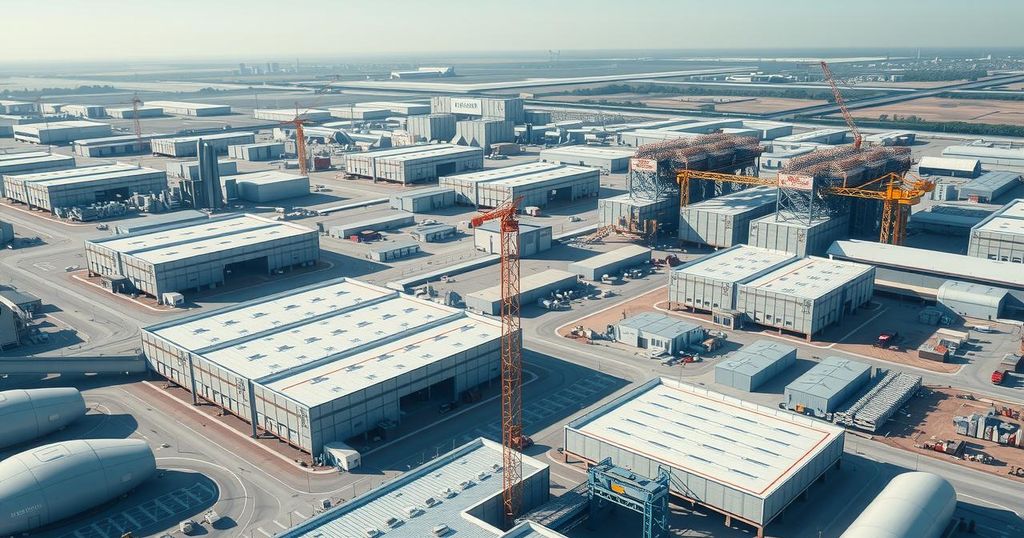World news
ALABUGA, ALABUGA SPECIAL ECONOMIC ZONE, ASIA, DEFENCE, DEFENSE INTELLIGENCE DIRECTORATE, DNIPRO, ENERGY INFRASTRUCTURE, EUROPE, EUROPE/ASIA, GUR, IRAN, KIM JONG UN, KOREA, NORTH, KURSK, KY, KYRYLO BUDANOV, MILITARY, MISSILE ATTACK, MOSCOW, NKH, NORTH KOREA, PYONGYANG, RUSSIA, SOUTH KOREA, TATARSTAN, UKRAINE, WAR, WEST
Michael Grant
0 Comments
North Korea Sending Thousands of Workers to Russia to Build Drones
North Korea is sending tens of thousands of workers to Russia to aid drone production and infrastructure rebuilding in Kursk. This collaboration is seen as a means to enhance military capabilities on both sides. The influx of workers comes after previous deployments of North Korean troops to defend the Kursk region, indicating a deepening of ties between Pyongyang and Moscow amidst the ongoing conflict in Ukraine.
North Korea is reportedly deploying tens of thousands of workers to Russia. The workers will support the production of attack drones and assist reconstruction efforts in the Kursk region. Ukrainian sources, including Lt. Gen. Kyrylo Budanov, head of Ukraine’s Defense Intelligence Directorate, suggest this marks a significant escalation in cooperation between North Korea and Russia, with implications for security across two continents.
Budanov outlined that the addition of drones might enable Kim Jong Un to launch mass attacks against South Korea, potentially overwhelming air defenses. Meanwhile, Russia would benefit from these North Korean workers by replenishing personnel losses from its ongoing conflict in Ukraine. Notably, this influx follows the previous deployment of over 11,000 North Korean troops to Russia last October, marking a notable deepening of military ties.
The Japanese outlet NHK reported that 25,000 North Korean workers will go to the “Shahed factory” located in Russia’s Alabuga Special Economic Zone. These workers are expected to receive training on unmanned aircraft in exchange for boosting production efficiency. The Alabuga factory has plans to escalate its output from 2,000 to 5,000 drones monthly, based on designs supplied by Iran.
Recent satellite images suggest the Alabuga facility is expanding, possibly to accommodate the influx of labor. According to the Ukrainian news outlet Militarnyi, the typical worker housing consists of two-story dormitories designed to host multiple occupants, providing essential amenities such as shared showers and restrooms.
The use of Shahed drones has become prevalent in Russia’s military strategy, primarily to carry out attacks across Ukraine. First utilized in September 2022, the drones have since undergone several enhancements, including larger warheads and autonomous capabilities, complicating Ukraine’s defense efforts. Most recently, the Ukrainian Air Force reported that Russia launched a significant number of Shahed UAVs against Ukraine overnight, underscoring the urgency of the situation.
Ukrainian drone strikes have also targeted the Alabuga factory due to its importance in producing Shahed drones. Notably, a recent strike was executed on June 15, marking a strategic effort to disrupt Russian capabilities. The operations involved modified aircraft that can carry greater explosive payloads and reach multiple targets.
Beyond the military applications, North Korea is also sending several thousand workers, including around 1,000 sappers for demining efforts and 5,000 workers for infrastructure restoration in Kursk. Russian Security Council Secretary Sergey Shoigu confirmed these plans following discussions with North Korean leaders. The region remains a hotspot of conflict, having been the site of intense battles following Ukraine’s surprise assault on August 6, 2024.
Budanov noted that these developments indicate a move towards increased drone production capabilities in North Korea, hinting at a shift in the military balance in Northeast Asia. He speculated that while the labor migrants from North Korea might fulfill roles typically filled by Central Asian workers, there remains a risk that they could be integrated into Russian military operations.
Additionally, Budanov shared insights on substantial Russian support for North Korea’s military advancements, including improvements to ballistic missiles and other advanced weaponry. Should these collaborations succeed, they could significantly bolster Russia’s military efforts in Ukraine, making the situation even more challenging for Ukraine’s defense against the increasing drone threats.
In summary, the recent deployment of North Korean workers to Russia highlights an escalating partnership between the two nations that presents new challenges for regional security. With North Korea’s workers set to bolster drone production and assist in rebuilding initiatives, Russia gains both personnel and enhanced military capabilities. This development poses significant concerns for Ukraine and could alter the dynamics of the ongoing conflict. Should these plans come to fruition, they will likely enhance Russia’s strategic position while exacerbating the security risks for Ukraine and its allies.
Original Source: www.twz.com




Post Comment